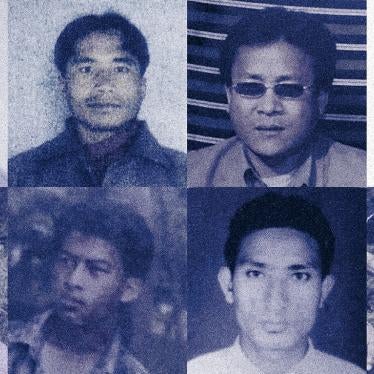This week's uprising in Kyrgyzstan didn't appear out of nowhere. For the last several years, many of this Central Asian country's people have felt betrayed by a government that came to power promising democracy and reform, but in their eyes delivered repression and nepotism instead. A confrontation had been brewing for months, with arrests of opposition leaders and restrictions on the media prompting public protests, which escalated when the government hiked utility prices. Meanwhile, the government's heavy-handed police methods have, according to some analysts, helped radicalize a growing part of the Muslim population in southern Kyrgyzstan.
If you raised these problems with U.S. government officials in the last year or so, they would typically say something like: "Yes, all of that is true, and we're very concerned. But [sigh], there are other equities." In Washington nowadays, "equities" is bureaucratic parlance for "the Pentagon has a stake in this issue." In the case of Kyrgyzstan and Central Asia, it means that the U.S. government's chief concern is keeping the region's roads, airfields, and airspace open for supplies moving to Afghanistan.
U.S. policymakers increasingly view Central Asia as a transit point to somewhere else. It is a region through which oil and natural gas flow to Europe, reducing U.S. allies' dependence on Russian energy supplies. It is a region through which fuel, food, and spare parts flow to surging U.S. and NATO forces in Afghanistan, reducing their dependence on a precarious Pakistani supply route. Officials and policy experts even have a new name for this region that captures its status as a logistical intermediary, rather than a set of distinct countries that matter in their own right: They call it the "Northern Distribution Network."
One hub in the "network" is Uzbekistan. Ruled for two decades by the government of Islam Karimov, Uzbekistan is a place where dissidents are routinely imprisoned and tortured; a few weeks ago, the government convicted a photographer for "insulting the Uzbek people" because she took pictures showing poor people in the country. Brutal repression in Uzbekistan's Fergana Valley -- including the 2005 massacre of hundreds of protesters in the city of Andijan -- has shut all avenues for peaceful dissent in Central Asia's most densely populated subregion and could create opportunities for radical groups to gain support. Five years ago, Uzbekistan expelled U.S. forces from an air base in the country, but continues to allow U.S. supplies to pass through. So the Pentagon has pushed for an easing of congressionally mandated sanctions that forbid direct U.S. aid to the Uzbek government.
Another hub is Kazakhstan. Unlike Kyrgyzstan, Kazakhstan has energy wealth and a relatively stable government. But that government, led by President Nursultan Nazarbayev, also maintains an atmosphere of quiet repression, stifling opposition media and manipulating the political process. Nazarbayev has rebuffed repeated requests from U.S. President Barack Obama's administration to accelerate political reforms and release from prison the country's leading human rights defender, Yevgeny Zhovtis. Yet Nazarbayev will be one of only a few leaders attending next week's nuclear security summit to get a one-on-one meeting with Obama.
In private meetings, the U.S. State Department keeps trying to press Central Asian leaders (including those in Turkmenistan -- one of the most repressive countries on Earth) to respect human rights. But those leaders probably think that the Pentagon is now a more important player in their region. And the U.S. government's approach has given them confidence that if they stand their ground, they will still get their meetings in the White House and visits from Centcom, their energy deals, and their cash payments.
Unfortunately, those deals and payments reinforce the very problems of corruption and poor governance that, as we saw this week, fuel political unrest in Central Asia. In Uzbekistan, the Pentagon has reportedly used a company controlled by the dictator's daughter to truck its goods across the country. Many Kyrgyz demonstrators were disgusted by signs that their leaders were personally profiting from the increasingly high payments they extracted from the United States for use of the country's Manas air base (and believed that the U.S. government stayed silent about their government's abuses to keep the base).
There is a real dilemma here. The U.S. military needs a transit route across this region. For Obama, supplying 83,000 U.S. troops in Afghanistan is obviously a higher priority than the internal problems of a small, remote country like Kyrgyzstan. But the administration should not forget that Central Asia's autocrats derive at least as much benefit from the U.S. presence in the region as the United States derives from their cooperation. These countries are also threatened by the Taliban; the sacrifices of U.S. troops in Afghanistan strengthen their security. They get paid for their help -- whether in the form of direct aid or contracts with local companies usually controlled by members of the elite. And most see partnership with the United States as a way to balance Russian, Chinese, and Iranian influence.
At the very least, the unrest in Kyrgyzstan ought to remind us that there are actually people living in the Northern Distribution Network. Ignoring their grievances about human rights abuses and poverty would not only be wrong -- it could undermine the stability of this region and alienate reformist forces that might someday come to power. And if that were to happen, good luck trying to distribute anything through Central Asia anymore.








